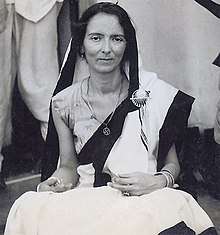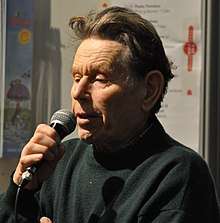Ecofascism
Ecofascism is a theoretical political model in which an authoritarian government would require individuals to sacrifice their own interests to the "organic whole of nature".[1]
| Part of a series on |
| Green politics |
|---|
.svg.png) |
|
Core topics |
|
Four pillars |
|
Organizations
|
Some writers have used it to refer to the hypothetical danger of future dystopian governments, which might resort to fascist policies in order to deal with environmental issues.[1] Other writers have used it to refer to segments of historical[2][3] and modern[4] fascist movements that focused on environmental issues.
Definition
Environmental historian Michael E. Zimmerman defines "ecofascism" as "a totalitarian government that requires individuals to sacrifice their interests to the well-being of the 'land', understood as the splendid web of life, or the organic whole of nature, including peoples and their states".[1]
Zimmerman argues that while no ecofascist government has existed so far, "important aspects of it can be found in German National Socialism, one of whose central slogans was "Blood and Soil".[1]
Ideological origins
Nazism
The authors Janet Biehl and Peter Staudenmaier suggest that the synthesis of fascism and environmentalism began with Nazism. In their book Ecofascism: Lessons from the German Experience, they note the Nazi Party's interest in ecology, and suggest their interest was "linked with traditional agrarian romanticism and hostility to urban civilization". Richard Walther Darré, a leading Nazi ideologist who invented the term "Blood and Soil", developed a concept of the nation having a mystic connection with their homeland, and as such, the nation was dutybound to take care of the land. Because of this, modern ecofascists cite the Nazi Party as an origin point of ecofascism.[5][6]
Savitri Devi

Savitri Devi was a prominent proponent of Esoteric Nazism and deep ecology. A fanatical supporter of Hitler and the Nazi Party from the 1930s onwards, she also supported animal rights activism. Devi was also a vegetarian from a young age and put forward ecologist views in her works. She wrote Impeachment of Man in 1959 in India, in which she declared her views on animal rights and nature. According to her, human beings do not stand above the animals; but in her ecologist views, humans are rather a part of the ecosystem and should respect all life, including animals and the whole of nature. Because of her dual devotion to both Nazism and deep ecology, she is considered an influential figure in ecofascist circles.[7]
Nouvelle Droite movement
The European Nouvelle Droite movement, developed by Alain de Benoist and other individuals involved with the GRECE think tank, have also combined green politics with right-wing ideas such as European ethnonationalism.[9]
Ted Kaczynski, the Unabomber
Ted Kaczynski, better known as "The Unabomber", is a figure cited as highly influential upon ecofascist thought. Between 1978 and 1995 Kaczynski instigated a terrorist bombing campaign aimed at inciting a revolution against modern industrial society, in the name of returning humanity to a primitive state he suggested offered humanity more freedom while protecting the environment. In 1995 Kaczynski offered to end his bombing campaign if The Washington Post or The New York Times would publish his 35,000-word manifesto Industrial Society and Its Future. Hoping to save lives, both newspapers agreed to those terms. The manifesto railed not only against modern industrial society but also against "leftists", whom Kaczynski defined as "mainly socialists, collectivists, 'politically correct' types, feminists, gay and disability activists, animal rights activists and the like".[10]
Because of Kaczynski's intelligence and ability to write in a high-level academic tone, his manifesto was given serious consideration upon release and became highly influential, even amongst those who severely disagreed with his use of violence. Kaczynski's staunchly radical pro-green, anti-left work was quickly absorbed into ecofascist thought.
In 2017 Netflix released a dramatisation of Kaczynski's life, entitled Manhunt: Unabomber. The popularity of the show thrust Kaczynski and his manifesto once again into the public's mind and raised the profile of ecofascism.[5][6]
Garrett Hardin, Pentti Linkola, and "Lifeboat Ethics"

Two figures influential in ecofascism are Garrett Hardin and Pentti Linkola, both of whom were proponents of what they refer to as "Lifeboat Ethics". Garrett Hardin was an American ecologist accused by the Southern Poverty Law Center of being a white nationalist,[11] whilst Pentti Linkola was a Finnish ecologist accused of being an active ecofascist who actively advocated ending democracy and replacing it with dictatorships that would use totalitarian and even genocidal tactics to end climate change.[12] Both men used versions of the following analogy to illustrate their viewpoint:
What to do, when a ship carrying a hundred passengers suddenly capsizes and there is only one lifeboat? When the lifeboat is full, those who hate life will try to load it with more people and sink the lot. Those who love and respect life will take the ship's axe and sever the extra hands that cling to the sides[5][6]
Association with mass shootings
The perpetrator of the 2019 Christchurch mosque shootings in New Zealand, Brenton Tarrant described himself as an ecofascist,[13][14] ethno-nationalist, and racist[15] in his manifesto The Great Replacement, named after a far-right conspiracy theory[16] originating in France.
Jordan Weissmann, writing for Slate, describes the perpetrator's ecofascism as "an established, if somewhat obscure, brand of neo-Nazi"[17] and quotes Sarah Manavis of New Statesman as saying, "[Eco-fascists] believe that living in the original regions a race is meant to have originated in and shunning multiculturalism is the only way to save the planet they prioritise above all else".[17]
The suspect in the 2019 El Paso shooting, Patrick Crusius, is believed to have written a similar manifesto, professing support for the Christchurch shooter.[18] Posted to the online message board 8chan,[19] it blames immigration to the United States for environmental destruction,[20] saying that American lifestyles were "destroying the environment",[21] invoking an ecological burden to be borne by future generations,[14][22] and concluding that the solution was to "decrease the number of people in America using resources".[21]
Critiques
According to environmentalist David Orton, the term is pejorative in nature and it has "social ecology roots, against the deep ecology movement and its supporters plus, more generally, the environmental movement. Thus, 'ecofascist' and 'ecofascism', are used not to enlighten but to smear".[23]
Accusations of ecofascism have often been made but are usually strenuously denied.[23][24] Such accusations have come from both sides of the political spectrum. Those on the political left see it as an assault on human rights, as in social ecologist Murray Bookchin's use of the term. Detractors on the political right include Rush Limbaugh and other conservative and wise use movement commentators. In the latter case, it is often a hyperbolic term for all environmental activists, including more mainstream groups such as Greenpeace and the Sierra Club.[24]
Bookchin's critique of deep ecology
Murray Bookchin criticizes the political position of deep ecologists such as David Foreman:
"There are barely disguised racists, survivalists, macho Daniel Boones, and outright social reactionaries who use the word ecology to express their views, just as there are deeply concerned naturalists, communitarians, social radicals, and feminists who use the word ecology to express theirs... It was out of this former kind of crude eco-brutalism that Hitler, in the name of 'population control,' with a racial orientation, fashioned theories of blood and soil... The same eco-brutalism now reappears a half-century later among self-professed deep ecologists who believe that Third World peoples should be permitted to starve to death and that desperate Indian immigrants from Latin America should be excluded by the border cops from the United States lest they burden 'our' ecological resources".[25]
Sakai on "natural purity"
Such observations among the left are not exclusive to Bookchin. In his review of Anna Bramwell's biography of Richard Walther Darré, J. Sakai observes the fascist ideological undertones of natural purity.[26] Prior to the Russian Revolution, the tsarist intelligentsia was divided on the one hand between liberal "utilitarian naturalists", who were "taken with the idea of creating a paradise on earth through scientific mastery of nature" and influenced by nihilism as well as Russian zoologists such as Anatoli Petrovich Bogdanov; and, on the other, "cultural-aesthetic" conservationists such as Ivan Parfenevich Borodin, who were influenced in turn by German Romantic and idealist concepts such as Landschaftspflege and Naturdenkmal.[27]
See also
References
- Zimmerman, Michael E. (2008). "Ecofascism". In Taylor, Bron R. (ed.). Encyclopedia of Religion and Nature, Volume 1. London, UK: Continuum. pp. 531–532. ISBN 978-1-44-112278-0.
- "...the phenomenon one might call "actually existing ecofascism", that is, the preoccupation of authentically fascist movements with environmentalist concerns". Peter Staudenmeier, "Fascist Ecology: The 'Green Wing' of the Nazi Party and its Historical Antecedents in Germany". In "Ecofascism: Lessons from the German experience", by Janet Biehl and Peter Staudenmaier, 1995.
- Olsen, Jonathan. Nature and Nationalism: Right-Wing Ecology and the Politics of Identity. New York: St. Martin’s Press.
- Matthew Phelan (2018-10-22). "The Menace of Eco-Fascism". New York Review of Books.
- Wilson, Jason (19 March 2019). "Eco-fascism is undergoing a revival in the fetid culture of the extreme right". The Guardian. Retrieved 19 January 2020.
- Bennett, Tom (10 April 2019). "Understanding the Alt-Right's Growing Fascination with 'Eco-Fascism'". Vice. Retrieved 19 January 2020.
- "Savitri Devi: The mystical fascist being resurrected by the alt-right". bbc.com. BBC. 29 October 2017. Retrieved 19 January 2020.
- "Fascism" by Roger Griffin, in Encyclopedia of Religion and Nature, edited by Bron Taylor. Continuum International Publishing Group, 2008. (pp. 639-644)
- Didion, Joan (April 23, 1998). "Varieties of Madness". The New York Review of Books. Archived from the original on August 13, 2017.
- "Garrett Hardin". Southern Poverty Law Center. Retrieved July 20, 2018.
- Adler-Bell, Sam (24 September 2019). "Why White Supremacists Are Hooked on Green Living". NewRepublic.com. New Republic. Retrieved 19 January 2020.
- Koziol, Michael. "Christchurch shooter's manifesto reveals" (March 15, 2019). Sydney Morning Herald.
- Achenbach, Joel (18 August 2019). "Two mass killings a world apart share a common theme: 'ecofascism': Environmental groups denounce racists who cloak themselves in green". The Washington Post – via ProQuest.
- Fisher, Marc; Achenbach, Joel. "Boundless racism, zero remorse: A manifesto of hate and 49 dead in New Zealand". The Washington Post. Retrieved 16 September 2019.
- Darby, Luke (5 August 2019). "How the 'Great Replacement' conspiracy theory has inspired white supremacist killers". The Telegraph. London – via ProQuest.
- Weissmann, Jordan (15 March 2019). "What the Christchurch Killer's Manifesto Tells Us". Slate. Retrieved 16 September 2019.
- Noack, Rick (6 August 2019). "Christchurch endures as extremist touchstone, as investigators probe suspected El Paso manifesto". The Washington Post – via ProQuest.
- Arango, Tim; Bogel-Burroughs, Nicholas; Benner, Katie (3 August 2019). "Minutes Before El Paso Killing, Hate-Filled Manifesto Appears Online". The New York Times.
- Owen, Tess (6 August 2019). "Eco-Fascism: the Racist Theory That Inspired the El Paso and Christchurch Shooters". Vice.
- Lennard, Natasha (5 August 2019). "The El Paso Shooter Embraced Eco-Fascism. We Can't Let the Far Right Co-Opt the Environmental Struggle". The Intercept.
- Darby, Luke (7 August 2019). "What Is Eco-Fascism, the Ideology Behind Attacks in El Paso and Christchurch?". GQ.
- Hoffmann, Helga (19 December 2004). "Ecofascism: What is It? A Left Biocentric Analysis". home.ca.inter.net. Retrieved 29 June 2014.
- "Green historian to Brandis: My Work's Been Abused". The Sydney Morning Herald. November 13, 2003. Retrieved 9 October 2010.
- Bookchin, Murray. Social Ecology versus Deep Ecology: A Challenge for the Ecology Movement. Originally published in Green Perspectives: Newsletter of the Green Program Project, nos. 4–5 (summer 1987).
- Sakai, J. (2003). The Green Nazi - an investigation into fascist ecology. Kerspledebeb. ISBN 978-0-9689503-9-5.
- Weiner, Douglas R. (2000). Models Of Nature: Ecology, Conservation, and Cultural Revolution in Soviet Russia. University of Pittsburgh Press. ISBN 978-0-8229-5733-1.
External links
- Ecofascism: What is It?, by David Orton.
- Darker shades of Green, by Derek Wall for Red Pepper.
- An alternative to the new wave of ecofascism, by Micah White for The Guardian, 16 September 2010.
- Eco-fascism: The ideology marrying environmentalism and white supremacy thriving online by Sarah Manavis.
